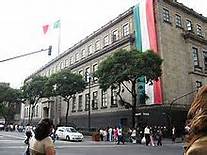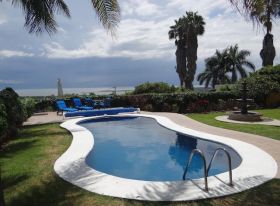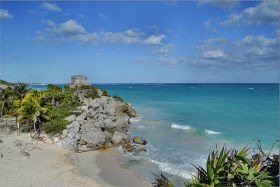Does Mexico believe in property rights and the rule of law, or is Mexico more corrupt?
John Venator - Casa de los Venados
 There is corruption in every place. As far as here in Mexico, I have never been asked for a bribe, and I have never paid anybody off. We have never encountered that. I have heard from a friend in Cancun that they were hit up for a bribe to get something done. I don't actually know if they did or did not pay.
There is corruption in every place. As far as here in Mexico, I have never been asked for a bribe, and I have never paid anybody off. We have never encountered that. I have heard from a friend in Cancun that they were hit up for a bribe to get something done. I don't actually know if they did or did not pay. On the whole, I think Mexico is a country of laws I think the corruption you hear about sometimes is, shall we say, political corruption, where some...
 There is corruption in every place. As far as here in Mexico, I have never been asked for a bribe, and I have never paid anybody off. We have never encountered that. I have heard from a friend in Cancun that they were hit up for a bribe to get something done. I don't actually know if they did or did not pay.
There is corruption in every place. As far as here in Mexico, I have never been asked for a bribe, and I have never paid anybody off. We have never encountered that. I have heard from a friend in Cancun that they were hit up for a bribe to get something done. I don't actually know if they did or did not pay. On the whole, I think Mexico is a country of laws I think the corruption you hear about sometimes is, shall we say, political corruption, where some elected official is getting paid off to do something that favors some businessman. For example, recently it was in the news that the wife of a well-known major national politician here in Mexico bought a house with a loan. It was a non-interest loan from a man who was looking for some favors from the government. To me that is more of the corruption that happens here in Mexico. It happens worldwide and to some degree in the US. We have never encountered any kind of corruption or request for bribes here, living in any part of Mexico.
(Day of the Dead skeleton sculpture, Mexico, pictured.)
Posted October 1, 2015
Alberto Alvelais - Alvelais & Asociados
 Private property in Mexico is almost sacred, and one of the most well kept rights in the country. We have access to the supreme courts, to the federal courts and by means of fighting federal injunctions, we have full protections for ownership and property rights.
Private property in Mexico is almost sacred, and one of the most well kept rights in the country. We have access to the supreme courts, to the federal courts and by means of fighting federal injunctions, we have full protections for ownership and property rights. Foreigners have the same access to the court system in Mexico and can expect to be treated exactly the same way as a Mexican national.
...
 Private property in Mexico is almost sacred, and one of the most well kept rights in the country. We have access to the supreme courts, to the federal courts and by means of fighting federal injunctions, we have full protections for ownership and property rights.
Private property in Mexico is almost sacred, and one of the most well kept rights in the country. We have access to the supreme courts, to the federal courts and by means of fighting federal injunctions, we have full protections for ownership and property rights. Foreigners have the same access to the court system in Mexico and can expect to be treated exactly the same way as a Mexican national.
There’s corruption in the court system generally in Mexico. Not all the judges are corrupted and not all the judges are clean but any foreigner could apply to the Mexican legal system as any other Mexican. You need to have a good lawyer and to be watching the process, just to avoid any type of corruption that could have influence on the process.
There could be certain corruption on the first stages of the trials but the upper courthouses are really difficult to be corrupted and the federal courthouses are very difficult to be corrupted. When you arrive to the protection of the federal jurisdiction, it is not corrupted as the other jurisdictional institutions. If you go to the Mexican Supreme Court, there is no corruption.
(The Supreme Court of Justice of the Nation building, the Mexican Supreme Court, Mexico City, Mexico, pictured.)
Posted May 31, 2016
Chris Gruenwald - Biencom Real Estate
 Mexicans take property rights seriously. If you are not on a border or the coast (for example, if you are in Lake Chapala, which is in the interior), you have the same property rights as a foreigner as you would as a Mexican citizen. If you are a property owner here, you are protected by the same rules as a Mexican citizen and have to abide by the same rules as a Mexican citizen.
Mexicans take property rights seriously. If you are not on a border or the coast (for example, if you are in Lake Chapala, which is in the interior), you have the same property rights as a foreigner as you would as a Mexican citizen. If you are a property owner here, you are protected by the same rules as a Mexican citizen and have to abide by the same rules as a Mexican citizen. If you look for corruption, you will find it anywhere. Certainly, here...
 Mexicans take property rights seriously. If you are not on a border or the coast (for example, if you are in Lake Chapala, which is in the interior), you have the same property rights as a foreigner as you would as a Mexican citizen. If you are a property owner here, you are protected by the same rules as a Mexican citizen and have to abide by the same rules as a Mexican citizen.
Mexicans take property rights seriously. If you are not on a border or the coast (for example, if you are in Lake Chapala, which is in the interior), you have the same property rights as a foreigner as you would as a Mexican citizen. If you are a property owner here, you are protected by the same rules as a Mexican citizen and have to abide by the same rules as a Mexican citizen. If you look for corruption, you will find it anywhere. Certainly, here in Mexico, corruption is more out in the open than in other places. You are more likely to be asked for a tip as opposed to receiving a ticket by a traffic cop. For most expats living here that is the only corruption they will run into. Corruption is not something that affects the expat population as much as the natives here who are in business. Personally, even as a businessperson, corruption has never been a problem for me. It is not something that I experience a lot but it is present.
(Home in a country club community, Lake Chapala, Mexico, pictured.)
Posted October 4, 2016
Yolanda Martinez
 If you own a property in Mexico, you have an escritura, which would be the equivalent of the grant deed in the United States. It’s in your name. In the United States, you use a title company. In Mexico, you use a notary. A notary in Mexico is not the same as in the United States. It’s not some common Joe who took a test and has a stamp. No. Notaries in Mexico are high-level attorneys who have masters or who are qualified and went through the process to become a notary.
If you own a property in Mexico, you have an escritura, which would be the equivalent of the grant deed in the United States. It’s in your name. In the United States, you use a title company. In Mexico, you use a notary. A notary in Mexico is not the same as in the United States. It’s not some common Joe who took a test and has a stamp. No. Notaries in Mexico are high-level attorneys who have masters or who are qualified and went through the process to become a notary....
 If you own a property in Mexico, you have an escritura, which would be the equivalent of the grant deed in the United States. It’s in your name. In the United States, you use a title company. In Mexico, you use a notary. A notary in Mexico is not the same as in the United States. It’s not some common Joe who took a test and has a stamp. No. Notaries in Mexico are high-level attorneys who have masters or who are qualified and went through the process to become a notary.
If you own a property in Mexico, you have an escritura, which would be the equivalent of the grant deed in the United States. It’s in your name. In the United States, you use a title company. In Mexico, you use a notary. A notary in Mexico is not the same as in the United States. It’s not some common Joe who took a test and has a stamp. No. Notaries in Mexico are high-level attorneys who have masters or who are qualified and went through the process to become a notary.They also are respected as judges in our state of Jalisco and in most of the states in Mexico. They are the ones who deed our properties. Therefore, you cannot lose your property. Someone coming in the middle of the night and stealing your property from you, that’s not heard of in Mexico anymore. For property near the beach, that’s why you have the trusts. In the inland areas such as Chapala, San Miguel de Allende, and other inland areas in Mexico you don’t have a problem. You won’t lose your property. It’s yours. You have rights to that property.
.png)
The recent situation in Tulum is a different scenario because that would be like Indian Reservation land in the States because it’s an “ejido” land. You have be very careful when buying property or opening up a business in a foreign country to know that you are on the right type of land because we have different types of lands here. In our revolution, and after the church took some of the properties, the Mexican government gave property back to the farm workers and that’s what the ejido. Ejido lands are only owned by Mexican citizens. Foreigners cannot own there. If it is changed from an ejido to a small property, after making it a normal type of land, a foreigner may own through a trust. You can’t even be involved in ejido and their internal regulations because you’re not Mexican and you’re not from that area or that region. The ejido system was set up in order to help the Mexicans regain property that was stolen from them.
Relative to corruption, there is corruption anywhere in the world. We have so many laws and regulations, from county, the state, federal laws, if you would like to open a business in Mexico, make sure you do it the right way. Get your business permit. If you were opening up a liquor store where my office is located, you would go to the county of Chapala, see the director of licensing and ask him, “What are the means for me to open my liquor store?" He will tell you. “Mr. Smith, you are going to need to show me your contract or the property deed of where you’re putting the liquor store, your RFC number (your tax ID number; as a foreigner, you can have tax ID numbers), your green card (temporary residency card) and the application. Then pay a fee in the county. That’s one part.
Then you’ll have the license to open the store. You’ll open the store and you’ll have to deal with providers so they’re going to ask for “facturas,” which are invoices, and then you’ll have to have an accountant, and have an attorney, just for the beginning of it. It sounds complicated but have an attorney just so someone can orientate you into having everything done correctly, so someone will come and try to steal or to take away your business because you didn’t do it many people have attorneys or accountant facilitate the process and get the permits for them. It’s not difficult; it’s just meeting the requirements. The requirement sheets are simple. You just need to make sure you follow the rules.
I know Mexico has a reputation of being corrupt, which is also because of attorneys and of people that buy into it. They say, “Oh I can do it faster.” Or, “I can facilitate this. I know such and such.”
If you follow the rules and play the things correctly, Mexico is not corrupt. It takes time because our system is not the same as the United States. The Mexican legal system is Greek – Roman. It’s not Anglo-Saxon. It’s not oral. Therefore, everything is a bunch of paperwork. That’s the one thing you will spend on – copies. But it’s not only the country’s fault, it’s also the people who have allowed it to happen and foreigners saying, “I can just give you 500 pesos” and try to buy officials off.
(Beach near Mayan ruins, Tulum, Mexico, pictured.)
Posted August 10, 2017


